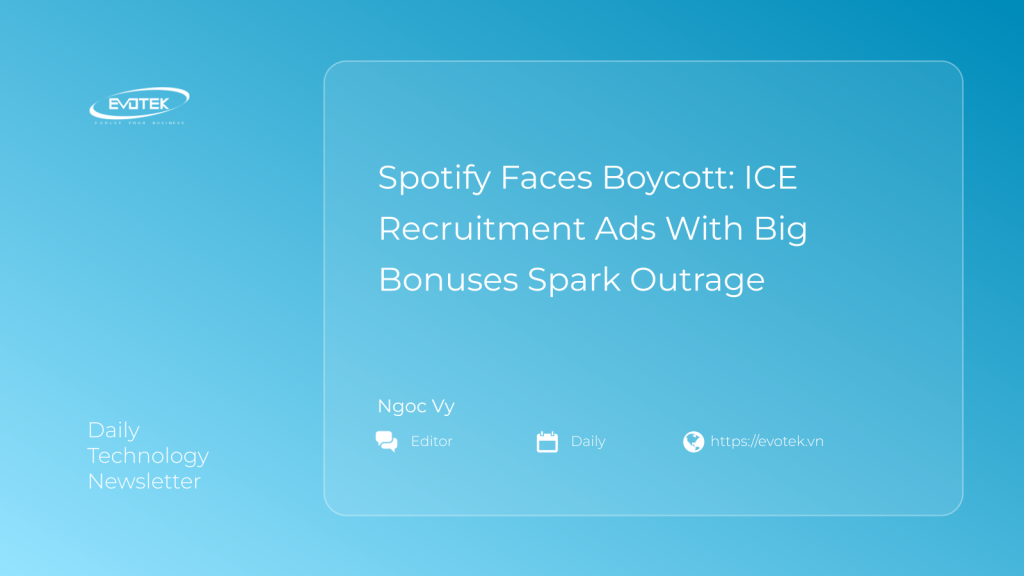A seemingly harmless advertisement has ignited a significant controversy for Spotify, one of the globe’s leading music streaming platforms. Users across the platform’s free tier have reported hearing audio spots urging them to join the U.S. Immigration and Customs Enforcement (ICE) to “protect America,” complete with promises of substantial ‘$50,000 signing bonuses.’
This unexpected campaign by the U.S. Department of Homeland Security (DHS) has provoked widespread backlash, leading many listeners to voice their complaints on social media and even initiate boycotts against Spotify. The platform is now grappling with the fallout of hosting ads for an agency frequently at the heart of contentious debates surrounding U.S. immigration policy.
The Spark: What Were the ICE Ads Saying?
Reports of these jarring recruitment spots surfaced last week, quickly gaining traction across platforms like Reddit, TikTok, and X. Free, ad-supported Spotify users found calls for new ICE recruits embedded within their music and podcast sessions.
One TikTok user, @miss.mia777, recounted their experience: “I get an ad and it starts with, ‘millions of dangerous illegals are rampaging the streets. Join ICE today.’ I picked up my phone with a quickness and deleted the app.” Such testimonials highlight the immediate and strong negative reactions. Recordings circulating online also feature a male voice-over detailing benefits for new recruits, including a lucrative ‘$50,000 signing bonus.’
It’s important to note that these recruitment ads are not exclusive to Spotify. Similar spots have also appeared on HBO and YouTube, while the DHS consistently promotes comparable material on its own social media channels, emphasizing themes of “protecting America” and “defending the homeland.”
Consumer Boycotts: A Historical Perspective
Lucy Atkinson, an associate professor at The University of Texas at Austin’s Moody College of Communication, shed light on the nature of consumer protests. She explained to Newsweek, “Consumer boycotts are a staple of American politics, starting with the Boston Tea Party up to today’s boycotts of Coors, Disney, Target, Chick-fil-A, Walmart, etc. For consumers, boycotts can be an appealing form of civic engagement from both sides of the political spectrum. And yet the efficacy of a boycott remains uncertain.”
The federal government has a long-standing history of advertising, including recruitment drives dating back over a century. Atkinson cited the iconic Uncle Sam “I want you for the US Army” poster as a highly successful campaign. However, she noted that after the war, questions arose about whether such advertising went “too far” in fostering animosity or excessive patriotism.
Government spending on advertising is substantial, with approximately $1.8 billion allocated annually, more than double the amount spent in 2018. While the Department of Defense accounts for the largest share, DHS spending, particularly on recruitment for agencies like ICE, is expanding, with a projected budget of $380 million this year.
User Outcry: Why the Strong Reaction?
As news of the recruitment campaign spread, Spotify users flocked to the company’s community forum to voice their profound disapproval:
- One user posted: “Is Spotify running advertising for ICE or Border patrol recruitment? If I see 1 ad for such nonsense, I will be cancelling my Spotify accounts and will encourage all others to do the same.”
- Another community member declared: “I am also cancelling my subscription. Ludicrous that anyone is posting ads for ICE. What a shame that ethics have tanked.”
While the exact number of users unsubscribing remains unconfirmed, numerous posts across social media and Spotify’s forum suggest a significant impact. The outrage targets both Spotify for hosting the ads and ICE itself, an agency under the DHS umbrella responsible for enforcing U.S. immigration law, which has faced heavy criticism for its conduct and perceived lack of oversight, particularly under previous administrations.
Spotify and DHS Respond to the Controversy
A spokesperson for Spotify issued a statement to Newsweek:
"This advertisement is part of a broad campaign the US government is running across television, streaming, and online channels. The content does not violate our advertising policies. However, users can mark any ad with a thumbs-up or thumbs-down to help manage their ads preferences."
Meanwhile, DHS Assistant Secretary Tricia McLaughlin vigorously defended the campaign:
"There's nothing offensive or partisan about removing murderers, pedophiles, rapists, and gang members from America's communities. What's offensive is Biden allowing millions of criminal illegal aliens to rape, maim, and murder U.S. citizens. The ICE recruitment campaign is a resounding success with more than 150,000 applications rolling in from patriotic Americans answering the call to defend the Homeland by helping arrest and remove the worst of the worst from our country."
The Road Ahead: Efficacy of Boycotts and Future Implications
Atkinson acknowledged the inherent challenges in measuring the success of public protests: “Part of the problem is that it’s hard to measure the success of a boycott. Oftentimes, it’s about generating media and public attention. The other challenge is that boycotts can be hard to sustain. Consumers often lose interest or it stops becoming a primary focus.”
She added that for the Spotify boycott, its effectiveness will depend on the sustained nature of the calls for action, the availability of viable alternative streaming platforms for consumers, and whether users are genuinely prepared to make the switch.
The DHS and ICE show no signs of slowing their extensive recruitment drive, which has already attracted over 100,000 applications. For Spotify, the long-term impact of this user backlash on its revenue and reputation is yet to be fully determined.
What are your thoughts on Spotify’s decision to run these ads, and do you believe a consumer boycott will ultimately prove effective?

 日本語
日本語 한국어
한국어 Tiếng Việt
Tiếng Việt 简体中文
简体中文